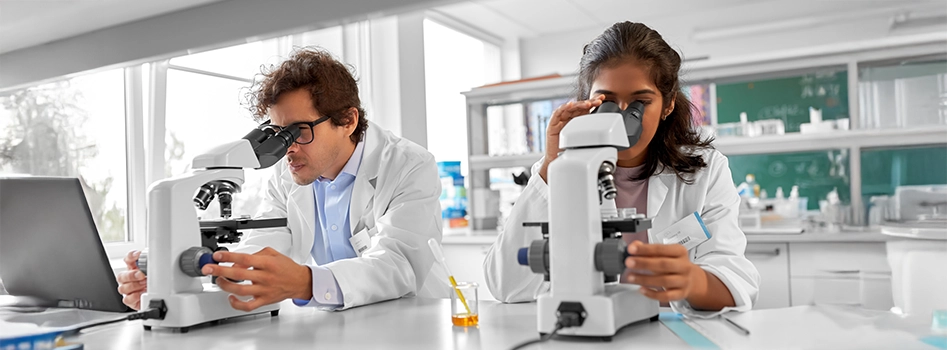A hands-on clinical embryology training program offers a unique blend of theory with practice, helping students gain the necessary skills that are essential for a successful career in clinical embryology. These programs provide a detailed learning about human reproduction, and ART techniques like embryo culture, ICSI, ovarian stimulation, and egg retrieval. The training, along with lectures and workshops in this program, is designed to provide a strong foundation for real-world clinical embryology practice. If you are curious to know what exactly to expect in a hands-on clinical embryology training program, this blog is for you.
Importance of Hands-On Training in Clinical Embryology
As much as theoretical knowledge is important in clinical embryology, hands-on training is also a crucial step in gaining a complete understanding of how clinical embryology actually works in practice. Hands-on training helps students enrolled in the clinical embryology training programs to turn their theoretical knowledge into practical applications for complex procedures, like embryo culture, gamete handling, cryopreservation, etc. This practical experience also helps in building students’ understanding of patient care and safety in embryology techniques. It prepares aspiring embryologists for the challenges and responsibilities in IVF labs or research institutes, equipping them with the skills necessary for this field.
Structure of a Clinical Embryology Hands-On Training Program
Duration
The duration of the clinical embryology hands-on training program can vary based on the programs offered by various institutions, ranging from a few months to a couple of years. Be it a post-graduate diploma, an integrated B.Sc.-M.Sc. program, or a certification program, students have a dedicated hands-on training schedule in clinical embryology.
Format
Based on the specific training program, students can pursue hands-on clinical embryology on a full-time or part-time basis. This gives them the flexibility to master hands-on skills and balance their academic goals.
Modules
From andrology, embryology modules, and ART methods to research methodology & biostatistics, reproductive anatomy to cryobiology and in-vitro fertilization techniques, these hands-on training programs include a wide range of concepts in the modules, helping students gain complete knowledge in clinical embryology.
Curriculum Overview
With a complete curriculum in ART, cryopreservation, embryo culture, and lab tools management, students gain hands-on experience for careers as clinical embryologists, lab managers, and researchers. From basic embryology knowledge to advanced techniques in embryology and lab practices, students can easily master their clinical embryology practice.
Key Skills You Will Acquire in Hands-On Training Program
Micromanipulation Techniques
Students learn micromanipulation skills, like Intracytoplasmic Sperm Injection (ICSI) and embryo handling. These advanced techniques build confidence and technical expertise that students need to perform delicate embryology procedures with accuracy in real-world laboratory environments.
Embryo Culture and Assessment
Students gain expertise in culturing embryos in optimal lab conditions, regularly monitoring their development, and analysing the embryo quality. This skill helps them make the right decisions for patient treatments during infertility treatments and improve success rates while contributing to higher standards in reproductive healthcare practices.
Cryopreservation Methods
The latest cryopreservation techniques, like thawing of frozen embryos & gametes, and vitrification, are taught in the hands-on training programs. Students will acquire the ability to preserve genetic material with careful handling techniques for long-term viability. They can offer their patients safe and improved treatment options with their advanced laboratory techniques.
Ethical Considerations and Patient Interaction
Not only the clinical embryology techniques, but they also understand the ethical concerns in embryology as well. This includes informed consent, confidentiality of patients, and patient communication with emotional intelligence. These skills make sure that students handle patients with empathy while following the medical ethics codes, which leads to trust-building and responsible clinical practice in reproductive medicine.
Benefits of Clinical Embryology Hands-On Training Program
Networking Opportunities
Students can make valuable professional connections with peers, mentors, and industry experts during the clinical embryology hands-on program. These networks allow them to collaborate, find career opportunities, and help them thrive in the competitive field of clinical embryology.
Access to Expert Instructors
Hands-on clinical embryology training programs provide students access to highly experienced embryologists and reproductive medicine professionals. Their guidance helps students to gain practical insights and develop strong foundational and advanced practical skills.
Enhanced Career Prospects
Hands-on training equips students with skills that are necessary in IVF clinics, infertility hospitals, and research centers across the world. This practical training in clinical embryology techniques improves their career opportunities.
Contribution to Research and Development
Students who master their practical skills in clinical embryology can contribute effectively to research in the field. These hands-on programs allow them to apply evidence-based skills to practice and play an important role in improving reproductive technologies for better patient outcomes.
Conclusion
In conclusion, students enrolled in the clinical embryology hands-on training programs can expect a bridge to the gap between theory and practice, while learning critical skills and ethical considerations for a successful career in the field. From micromanipulation techniques to cryopreservation methods, students can master their skills in clinical embryology with these hands-on training programs.
At MOMSOON Academy, we offer hands-on clinical embryology training programs, providing students with expert guidance, lab exposure, and opportunities for meaningful contributions to the field of reproductive medicine. Reach out to MOMSOON Academy today and enroll in the top clinical embryology programs for a successful career.






